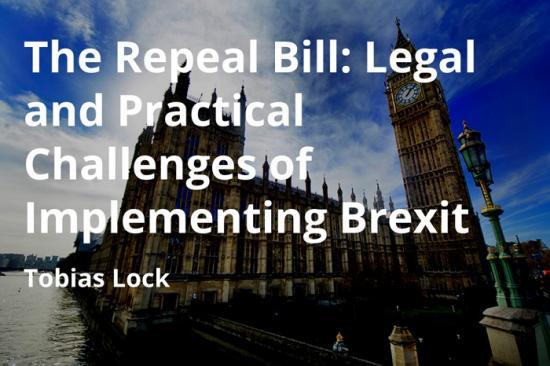
This site uses cookies, by continuing to use this site you accept the terms of our privacy policy
Feed 2.0 Loading...
The Repeal Bill - New Policy Paper from Scottish Centre on European Relations
29th June 2017

"The Repeal Bill - the Legal and Practical Challenges of Implementing Brexit" by Dr Tobias Lock, Senior Lecturer and Co-Director, Europa Institute, University of Edinburgh.
The Scottish Centre on European Relations today, 29th June 2017, issues a new policy paper on the Repeal Bill and its passage through Westminster and the devolved legislatures. [url=https://www.scer.scot/database/ident-2836]https://www.scer.scot/database/ident-2836/url]
The report's author, Dr Tobias Lock, said: "Whatever problems arise, the Repeal Bill needs to pass through Westminster for any model of Brexit - soft, hard, ‘no deal' - if there is not to be a legal vacuum."
The report argues there are risks of seriously inadequate scrutiny, unanswered legal questions on the new concept of ‘incorporated EU law', risks of constitutional crisis both over the passage of legislative consention motions and over UK frameworks being set up for devolved areas such as agriculture, environment and fisheries. The House of Lords will also now have a much stronger role in potentially amending and blocking or delaying the bill. The government will need to offer compromises and the opposition and devolved assemblies and governments will need to find new and innovative ways of scrutinising secondary legislation.
Dr Tobias Lock said: "The challenges posed by the Repeal Bill are very substantial - from a political, legal, timing and devolution point of view. Managing its passage pose huge challenges for government and opposition including the devolved governments and legislatures"
The Report Makes Six Key points:
1 - Repeal Bill Vital for Any Brexit Path (including the ‘no deal' scenario) The Repeal Bill is a vital element of the Brexit process. Legislation converting existing EU law into domestic law is a necessary measure to avoid gaps in UK law once Brexit has happened. Any form of Brexit - whether Brexit without a deal or a ‘soft Brexit' resulting in membership of the EEA - will require legislation to this effect.
2 - Risk of Indequate Parliamentary Scrutiny. There is a danger that substantive changes to incorporated EU law will be made without proper parliamentary scrutiny. Amendments to incorporated EU law will become possible by way of secondary legislation, i.e. they will be done by the government and not by parliament. While this is a sensible way forward where technical questions are concerned, it could impact on substantive changes too.
It is therefore essential that parliament ensures in the Repeal Act that these powers of amendment are properly supervised. Due to the volume of changes necessary before Brexit and due to the great time pressures compounded by a hung parliament, the standard procedures used by parliament - affirmative and negative - may prove ineffective. Hence parliament should consider new and innovative ways of scrutinising proposed secondary legislation under the Repeal Act.
3 - Constitutional Crisis Risk if Devolved Legislatures Refuse Legislative Consent. The devolved legislatures are expected to be asked for their legislative consent. If consent is refused, there is nothing that could legally prevent the Westminster parliament from passing the Repeal Bill regardless, but this would come at a high political cost and might result in a constitutional crisis, the evolution of which would be unpredictable.
4 - Controversy and Constitutional Stand-off also likely if EU Agriculture, Fisheries and Environment powers are Retained at UK Level: The Repeal Bill is likely to (at least temporarily) reserve policy areas currently determined by EU law, which would normally be devolved. This will in particular affect the environment, agriculture and fisheries. This will prove highly controversial in the devolved parts of the UK. While the retention of common frameworks in some areas can be considered desirable to preserve the UK's own domestic market, mitigating measures should therefore be considered. These could include an equal involvement of the devolved legislatures and governments in the policy-making process (e.g. by giving them veto rights); or compensatory devolution of other powers to them; or a stronger involvement of the devolved governments in the Brexit negotiations.
5 - House of Lords in a Strong Position. The passage of the Repeal Bill puts the House of Lords in a strong position as it will not be bound to respect the Conservative party's manifesto under the Salisbury convention; equally, the two-year long session of parliament means that the House of Lords can delay its passage longer than would usually be the case.
6 - Substantial Legal Questions still need Addressing: The Repeal Act will create a new category of law in the UK: incorporated EU law (as interpreted in the past by the European Court of Justice) will continue to take primacy over existing UK law including statute. However, it will not have this effect with regard to legislation adopted after Brexit. There are several unanswered questions including the relationship between new devolved legislation and incorporated EU law, and between incorporated EU law and secondary legislation.


